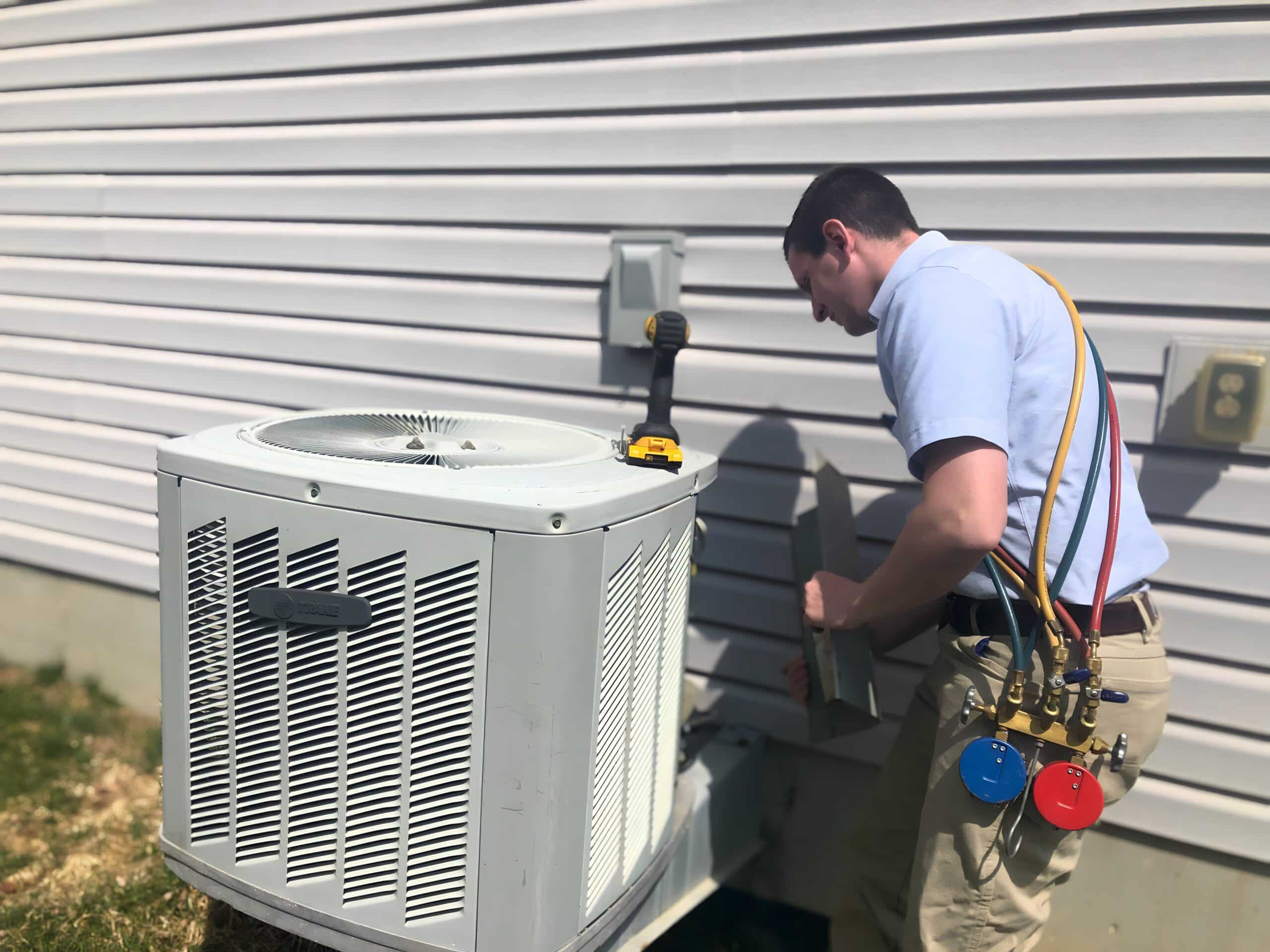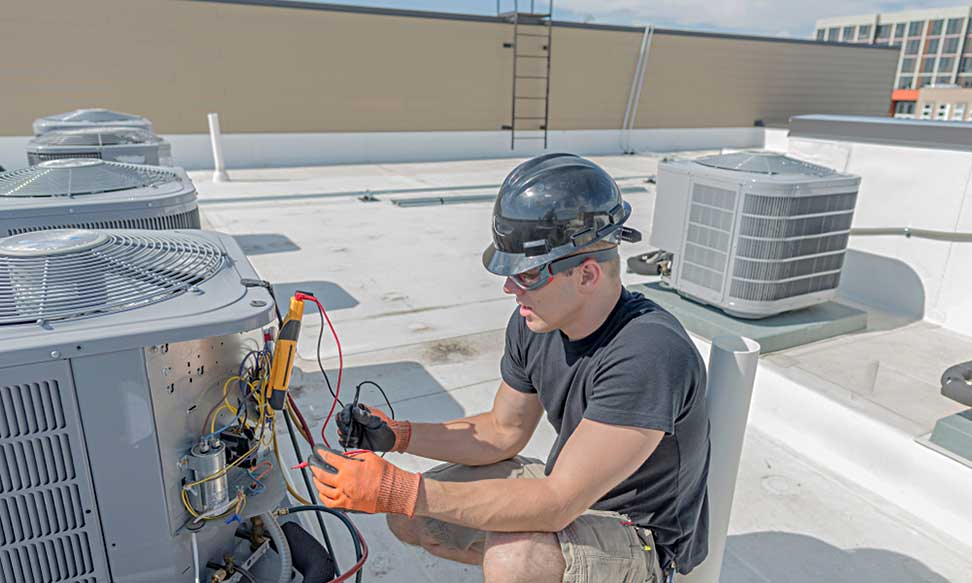Prevent Costly Repairs with Scheduled heat pump service
Prevent Costly Repairs with Scheduled heat pump service
Blog Article
Picking In Between a Heatpump and Heating System: Key Factors To Consider for Your HVAC Demands
When evaluating heating alternatives for cooling and heating needs, the decision between a heatpump and a heating system can be complex. Each system supplies distinct advantages customized to certain environments and energy effectiveness objectives. Recognizing these distinctions is important for making an enlightened option. Key factors such as setup expenses and environmental effect additionally make complex the selection process. Which option truly lines up with one's comfort and sustainability preferences? The following sections will discover these considerations in information.
Recognizing Heat Pumps: How They Work and Their Advantages
While lots of home owners think about various home heating alternatives, recognizing exactly how heatpump feature and their benefits can greatly influence their decision. Heatpump run by transferring warm instead of generating it. In the wintertime, they draw out warm from the outdoors air or ground and transfer it inside, while in the summertime, they reverse this process, cooling down the home by removing warmth outside. This dual functionality makes them functional for year-round climate control.One of the key advantages of warm pumps is their power performance. They use considerably less power compared to typical heater, potentially leading to lower energy costs (heat pump installation ooltewah tn). In addition, heatpump have a smaller sized carbon impact, making them an environmentally friendly selection. They additionally call for much less upkeep than traditional systems, adding to lasting expense savings. Generally, comprehending the mechanics and advantages of heat pumps can help home owners make informed decisions concerning their heating and cooling needs
Discovering Heaters: Types, Operation, and Benefits
Furnaces come in different types, consisting of gas, electric, and oil versions, each with unique functional systems. Comprehending these differences is necessary, as they influence effectiveness and home heating efficiency. In addition, heating systems offer numerous advantages, such as regular warm output and dependability in cooler climates.
Sorts of Heaters
Home heating systems can vary substantially in layout and operation, with furnaces being a popular option among home owners. There are numerous types of heating systems, each utilizing various gas sources and innovations. Gas furnaces are typical, leveraging all-natural gas to produce warm effectively. Electric furnaces, on the other hand, use electrical resistance to generate heat, typically preferred for their simple installment. Oil furnaces, while much less common, work in areas with minimal gas access (furnace replacement). In addition, condensing heaters make best use of power effectiveness by reusing and recording exhaust gases. Each kind runs via a system of heat exchangers and ductwork to distribute warm air throughout a home. Understanding the differences in between these heater types is essential for informed HVAC decisions
Benefits of Furnaces
For house owners seeking trusted warmth throughout cool months, the benefits of furnaces are considerable. Heaters supply consistent heating, making sure even temperatures throughout the home. They are particularly efficient in extreme cold, frequently outshining heatpump in cold conditions. Numerous types, consisting of gas, electric, and oil furnaces, use flexibility to satisfy varied needs and preferences.Furnaces additionally have a tendency to have reduced preliminary installment prices compared to heatpump, making them a more available option for numerous. Their durable style adds to a much longer life-span, with several devices lasting over 15 years with appropriate maintenance. Furthermore, contemporary furnaces are frequently equipped with innovative technology for improved performance, which can result in lowered power expenses. In general, furnaces continue to be a dependable option for reliable home heating.

Energy Effectiveness: Comparing Heat Pumps and Furnaces
When contrasting energy efficiency in between heat pumps and heating systems, the Seasonal Power Effectiveness Ratio (SEER) plays a necessary duty in identifying efficiency. Furthermore, a functional cost evaluation discloses the long-term financial ramifications of each system. Comprehending these variables can guide homeowners in making informed decisions regarding their heating services.
Seasonal Power Performance Ratio
Power effectiveness plays a necessary duty in the decision-making process in between heatpump and heaters, specifically when considering the Seasonal Energy Efficiency Proportion (SEER) This statistics actions the cooling effectiveness of heatpump over an entire air conditioning season, providing a standardized way to examine performance. Higher SEER rankings show higher power performance, converting to lower power usage and lowered utility costs. On the other hand, heating systems are usually examined using the Yearly Gas Utilization Performance (AFUE) ranking, which shows home heating performance. When comparing these 2 systems, home owners should prioritize SEER rankings for heatpump, as they directly influence overall energy cost savings and ecological sustainability. A thorough understanding of SEER can significantly influence the lasting contentment and cost-effectiveness of the picked cooling and heating service.
Functional Price Analysis
Understanding the operational costs connected with warm pumps and heaters is crucial for homeowners assessing their alternatives. Heatpump usually supply higher energy effectiveness, transforming electrical energy right into warmth with minimal waste. This results in lower monthly energy expenses, specifically in moderate environments. On the other hand, standard furnaces, specifically gas versions, may have reduced upfront prices yet can incur greater functional expenditures gradually due to fuel rates and performance ratings.Moreover, warmth pumps can work as both home heating and cooling systems, possibly decreasing the requirement for different a/c systems. While initial financial investments for warm pumps may be greater, their lasting financial savings in power efficiency can make them a much more cost-efficient selection for lots of houses. Mindful evaluation of neighborhood power rates is vital to determine the very best alternative.
Installment Expenses: What to Expect for each and every Furnace
Installment expenses for heating systems can differ significantly between heat pumps and furnaces, influencing house owners' decisions. Heat pumps normally have higher upfront installment expenses, typically ranging from $3,500 to $8,000, depending upon the unit dimension and intricacy of setup. This includes the exterior system, interior handling system, and required ductwork alterations. Conversely, heaters often tend to have lower preliminary prices, balancing between $2,500 and $6,000, which can be appealing for budget-conscious property owners. However, setup costs can boost if comprehensive ductwork is required.Moreover, the selection of gas type for heaters-- gas, lp, or electric-- can likewise influence installation expenses. While warm pumps supply power performance, their preliminary financial investment might prevent some customers. Inevitably, assessing installment costs together with long-lasting savings and efficiency will assist property owners in making informed choices regarding their heating unit.
Environment Factors To Consider: Which System Does Better in Your Location
Just how do environment conditions affect the performance of heating systems? The performance of heatpump and furnaces can vary substantially depending upon the neighborhood environment. In moderate environments, warmth pumps stand out by successfully transferring warm this contact form from the outside air, making them an energy-saving alternative. Their performance diminishes in incredibly cold temperature levels, where they might battle to draw out sufficient heat. Conversely, heating systems, particularly gas designs, provide regular and dependable warmth regardless of outdoor problems, making them better in cooler regions.In locations that experience milder winters months, heatpump can operate successfully year-round, supplying both cooling and heating. In contrast, areas with severe winter seasons commonly gain from the robustness of heaters. Ultimately, comprehending the neighborhood climate is vital when deciding in between a warmth pump and a heater, as it straight impacts their functional efficiency and overall efficiency.
Upkeep Needs: Long-Term Look After Warmth Pumps vs. Furnaces
While both warm pumps and heating systems call for routine maintenance to assure peak efficiency, their certain needs and care routines differ substantially. Heating systems commonly need less regular interest, with annual examinations sufficing to check for gas leakages, clean filters, and analyze general functionality. Their easier design typically permits straightforward repairs.In contrast, heat pumps require semiannual maintenance because of their twin duty in heating & cooling. This consists of cleaning coils, checking refrigerant degrees, and ensuring that both the interior and outdoor systems function at their finest. In addition, heatpump upkeep often entails even more elaborate components, making expert servicing essential.Neglecting maintenance can bring about diminished effectiveness and boosted energy expenses for both systems. Inevitably, house owners should take into consideration these long-term care demands when picking in between a warm pump and a heater, as positive maintenance can prolong the lifespan and performance of either system substantially.
Ecological Effect: Choosing a Lasting Heating Option
The ecological effect of heater is a crucial evaluation for house owners seeking sustainable alternatives. Warmth pumps are typically much more energy-efficient than standard heaters, as they transfer warmth instead of generate it, significantly minimizing carbon emissions. By utilizing renewable resource resources, such as air-source or geothermal warm pumps, property owners can additionally decrease their ecological footprint.On the other hand, gas furnaces release greenhouse gases and add to air contamination, though they typically supply greater warmth output. Nevertheless, improvements in technology have actually caused the advancement of high-efficiency furnaces that lessen emissions.Ultimately, picking a home heating system involves evaluating performance versus environmental influence. Home owners are motivated to assess local power resources and incentives for sustainable systems, making sure a choice that lines up with both personal convenience and ecological obligation. The decision affects not just instant convenience but additionally long-term sustainability and environmental health and wellness.
Frequently Asked Inquiries
How Much Time Do Warmth Pumps and Furnaces Typically Last?
The lifespan of heat pumps commonly varies from 15 to twenty years, while heaters can last in between 15 to thirty years. Routine upkeep significantly influences their long life and performance in supplying home heating solutions.
Can I Make Use Of a Warm Pump in Extremely Cold Climates?
Heat pumps can operate in extremely chilly climates, however their effectiveness reduces as temperature levels decline. In such problems, additional heating resources might be needed to keep comfy indoor temperatures and guarantee peak efficiency.

What Is the Sound Degree of Warm Pumps Versus Furnaces?
The noise levels of heatpump and furnaces vary substantially. Typically, heatpump operate more quietly than typical heating systems, making them more suitable for those delicate to appear, while heating systems may generate louder operational noises during home heating cycles.
Are Warmth Pumps Suitable for Both Cooling And Heating?
Heatpump are undoubtedly appropriate for both heating & cooling check this (heat pump service). They work by transferring warm, supplying effective temperature level control year-round, making them a functional option for house owners seeking an all-in-one cooling and heating service
What Dimension Heating System Do I Need for My Home?
Figuring out the ideal size heating unit for a home calls for reviewing elements such as square video, insulation top quality, local climate, and the home's format. Consulting a professional can ensure a precise analysis and suitable convenience. Warm pumps usually provide greater power performance, converting electric energy right into heat with very little waste. In modest environments, warmth pumps succeed by successfully transferring warmth from the outside air, making them an energy-saving Check Out Your URL alternative. Conversely, heating systems, particularly gas models, give consistent and reliable heat regardless of outdoor problems, making them more suitable in chillier regions.In areas that experience milder winter seasons, warmth pumps can operate effectively year-round, supplying both heating and cooling. Warmth pumps are generally more energy-efficient than conventional heaters, as they transfer warm rather than create it, greatly decreasing carbon exhausts. By utilizing renewable energy sources, such as air-source or geothermal warmth pumps, house owners can further lessen their environmental footprint.On the other hand, all-natural gas furnaces emit greenhouse gases and contribute to air contamination, though they typically provide greater warmth outcome.
Report this page